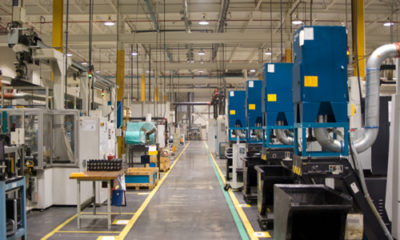The Manufacturers Association of Nigeria (MAN) has highlighted the significant challenges faced by the manufacturing sector in the first quarter of 2024.
The report, presented by MAN’s Director of Research and Advocacy, Oluwasegun Osidipe, paints a picture of an industry grappling with multiple economic headwinds, leading to reduced production and job cuts.
Speaking at a press conference in Lagos, Osidipe detailed the findings from the latest Manufacturers CEOs Confidence Index.
Despite a slight increase in overall confidence levels, current business conditions and employment rates remain troublingly low.
The report identifies several critical factors contributing to the sector’s struggles. Inflation, volatile energy prices, and unstable exchange rates have all significantly impacted manufacturing operations.
Customs duty rates have also added to the burden, driving up production and distribution costs by 20% in the first quarter alone.
As a result, capacity utilization—a measure of how much of a factory’s potential output is being used—fell by 9.7%.
The volume of production dropped by 10.14%, a sharp decline from the 4.6% contraction recorded in the previous quarter.
Employment in the sector also took a hit, with a 5.27% decrease in Q1 2024 compared to a 4.46% decline in the previous period. Sales volume further dropped by 7.16%, exacerbating the sector’s woes.
Francis Meshioye, President of MAN, underscored the severe impact of these economic challenges.
He emphasized that the combination of forex instability, inflation, and energy crises has eroded the competitiveness of Nigerian manufacturers.
Meshioye urged the government to address these “cost-push” factors driving inflation and to expedite the recapitalization of banks to support the sector.
“Undoubtedly, the manufacturing sector remains the most sustainable driver of steady economic growth, inflow of foreign exchange, and enduring shared prosperity.
MAN is therefore expectant that the Government will intentionally prioritize the manufacturing sector by implementing the sector-specific recommendations contained in this report and providing the required policy support and incentives.
This is the surest way of revamping the sector and repositioning the economy towards sustainable growth and development,” Meshioye stated.
The report calls for decisive government action to mitigate the economic challenges faced by the sector.
This includes resolving the issues related to high inflation driven by rising transportation costs for farm produce, infrastructure constraints, security challenges in food-producing areas, and the impact of exchange rate fluctuations on domestic prices for imported goods.
Adding to the sector’s challenges, MAN has also petitioned the Nigerian Electricity Regulatory Commission (NERC) to halt the hike in electricity tariffs for power users under the Band A category.
MAN argues that the recent increase in tariffs—from N68/kWh to N225/kWh—poses a significant threat to manufacturers, many of whom are already struggling to cope with existing economic pressures.
“Power to a manufacturer is like blood to a human being. It represents anywhere between 28 to 40 percent of our cost structure depending on how power-intensive your manufacturing process is. So you can imagine if there is a 250 percent increase in that particular cost, it is going to inflict damage,” said Segun Kadiri, Director-General of MAN, during a public hearing at NERC headquarters in Abuja.
Despite the bleak scenario painted by the report, there is a call to action for stakeholders to collaborate in addressing these challenges.

 Billionaire Watch3 weeks ago
Billionaire Watch3 weeks ago
 Startups4 weeks ago
Startups4 weeks ago
 News4 weeks ago
News4 weeks ago
 News4 weeks ago
News4 weeks ago
 Bitcoin4 weeks ago
Bitcoin4 weeks ago
 Naira4 weeks ago
Naira4 weeks ago
 Forex3 weeks ago
Forex3 weeks ago
 Treasury Bills4 weeks ago
Treasury Bills4 weeks ago

























